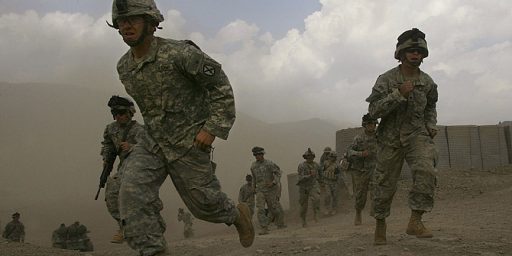E.R. Doctors Need Sleep–Stat!
Having watched almost every episode of E.R., I have long thought that the American system of training physicians by assigning them grueling shifts that keep them awake and peforming complicated procedures for 36 hours at a time was horrendously stupid. Research just published in the New England Journal of Medicine corroborates my armchair analysis:
Sleepy Medical Interns Called a Road Hazard (LAT)
Researchers found that interns more than doubled their risk of getting into a car accident after being on call, a stint that meant working for 32 consecutive hours with only two or three hours of sleep, on average. Interns were also nearly six times as likely to report nearly having an accident on their way home.
The report is the latest in a series of studies by researchers at Harvard Medical School and Brigham and Women’s Hospital in Boston that aim to quantify the dangers of requiring doctors to work long shifts with little rest. The researchers say that working for more than 24 hours causes interns to make serious medical errors and poses a public safety hazard.
Not only is performing medical procedures while half asleep dangerous for the patient, but one would think that learning would be reduced markedly in such a state as well.
Kevin Drum notes that,
I’ve heard a litany of defenses of this practice from senior medical folks, and they couldn’t sound more lame if they tried. They sound like nothing so much as a bunch of 50s frat boys defending hazing after some freshman has been found dead in an arroyo somewhere.
Yep. It’s amazing how many stupid practices continue simply because they’ve “always been done that way” and changing things now would “lower the standards.”
(Editor’s note: Apparently, “arroyo” is California-speak for “gully” or “creek.”)






“Apparently, “arroyo” is California-speak for “gully” or “creek.”
“Arroyo” is a Spanish word–which, I guess, you could consider “California-speak.”
You know, I actually had no idea that “arroyo” wasn’t a common word. But of course, I’ve lived my entire life in the cocoon that is California, so I guess that explains it.
(Plus, the Rose Bowl is located in the Arroyo Seco. Doesn’t everyone in the world know that?)
Having just finished residency, here are a few observations:
1. Anyone who watches ER and thinks they are geting a glimpse into medical care, medical education or the actual events taking place in a hospital is saddly mistaken.
2. Limits to duty hours are already in place. No resident can work more that 80 hours per week and cannot work more than 24 hours straight.
3. The point of extended duty and long work hours is to pack as much experience into a 3, 4, or 5 year residency as possible. Speaking as a surgeon, there is no book that can teach you as much as seeing and doing. There is clear evidence in the literature that doctors who perform more proceedures have better outcomes and less complications.
4. As a matter of law, every intern or resident is supervised by an attending physician. It is simply an urban legend that unsupervised first year doctors are doing brain surgery on no sleep.
Kappiy: Well, sure. But Kevin is a gingro, so I attribute the speech to his California heritage.
Kevin: I’ve heard the word in various television shows, likely a part of California place names. I figured something close to the meaning just by context.
Doc: The “I watch ER” part was meant to be glib. I don’t doubt that interns are supervised. Still, even 24 hours straight without sleep is dangerous. I suspect 12 hour shifts with intervening sleep would provide better learning.
Doc,
Having read James for some time now, I knew right away that he was kidding about the ER episodes. The 36-hour day should have been a clue as well.
James,
Ah, the good old days of listening to “Up On Cripple Arroyo”.
Doctor,
Sorry pal, you’re wrong. My wife is a 2nd year resident who regularly works way over hours. So does most of her pals from med school all over the country. They sign out but have to stay, they do work at home etc. If they complain they are slapped down.
Even interns do work that, if screwed up, can make a lot of trouble for a patient. No brain surgery (duh), but plenty of other things.
I agree that no book or lecture can properly train a physician, but inhuman hours do nothing except haze. If the resident needs more training, extend the residency.
I’m not surprised to hear a surgeon saying it’s all ok – you guys are crazy with hours, and it’s true, many residents WANT the hazing. But if it isn’t good for patients, and it isn’t good for training, what IS it good for?
A simple question – would you let your kids get on a bus whose driver had been up 36 hours? Even if that driver’s well-rested boss was sitting in the front seat?